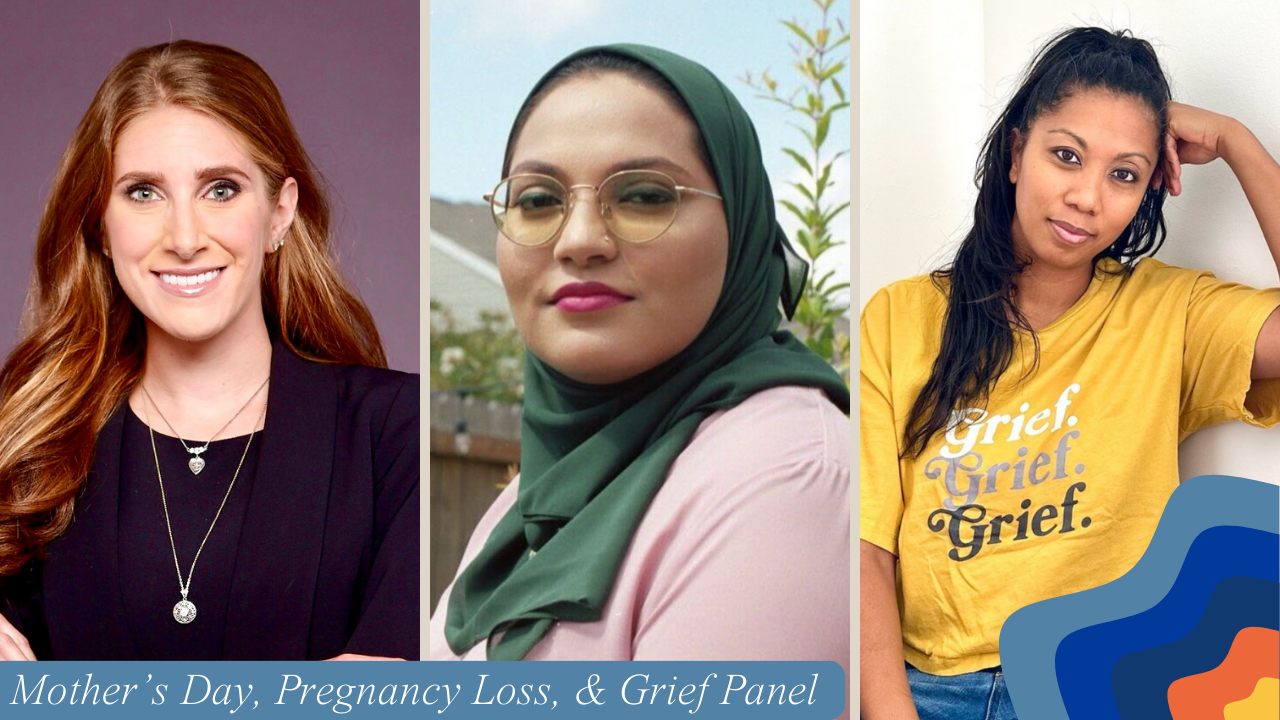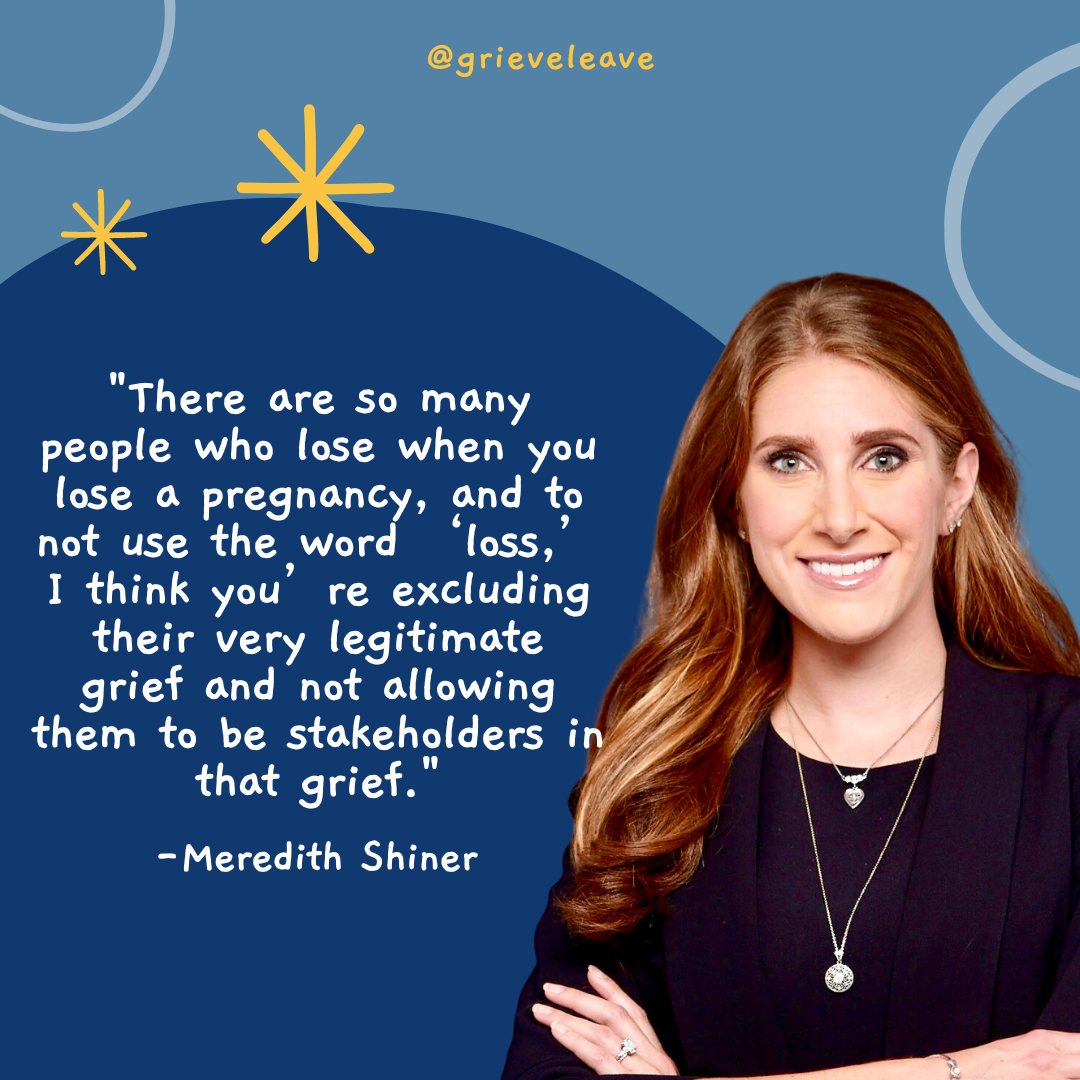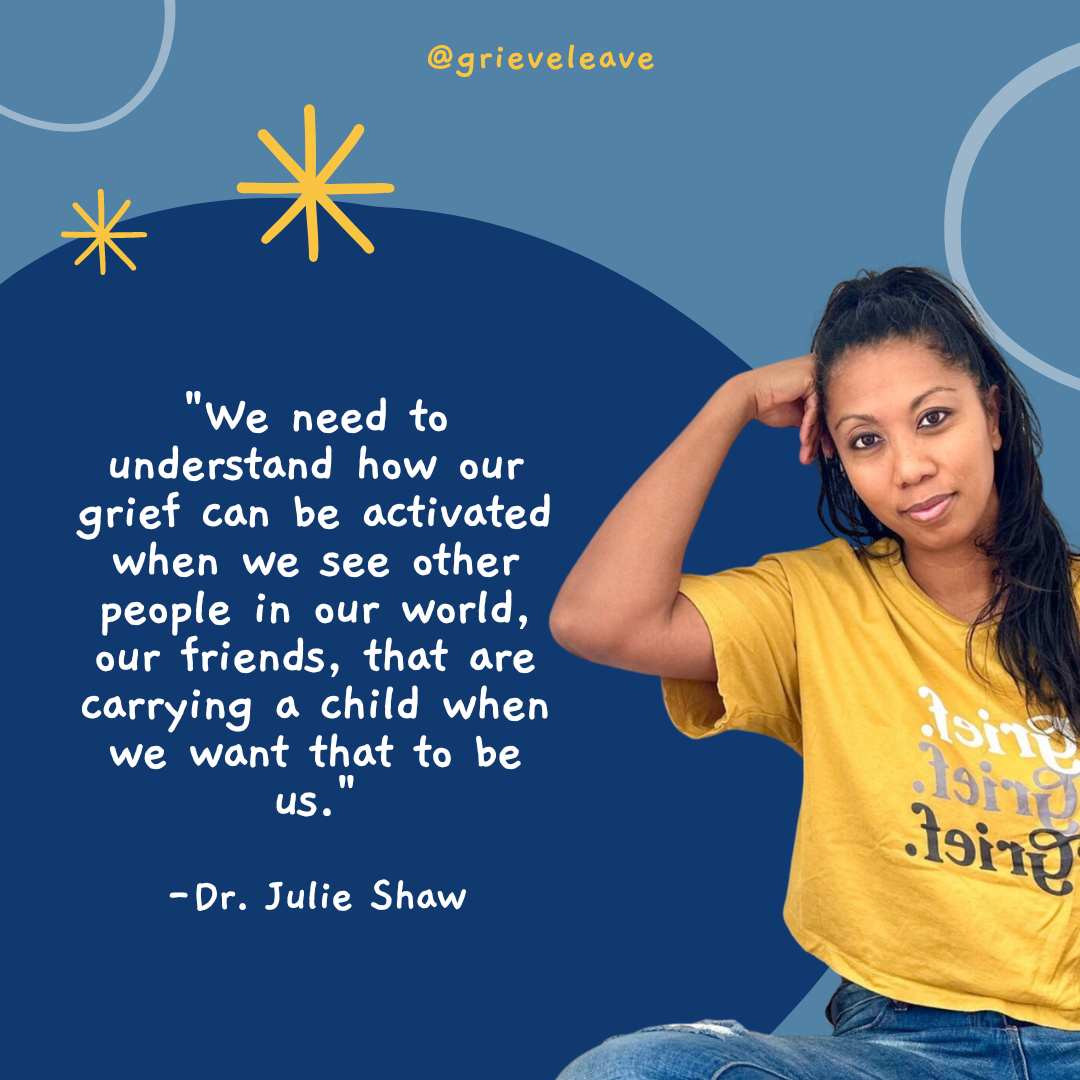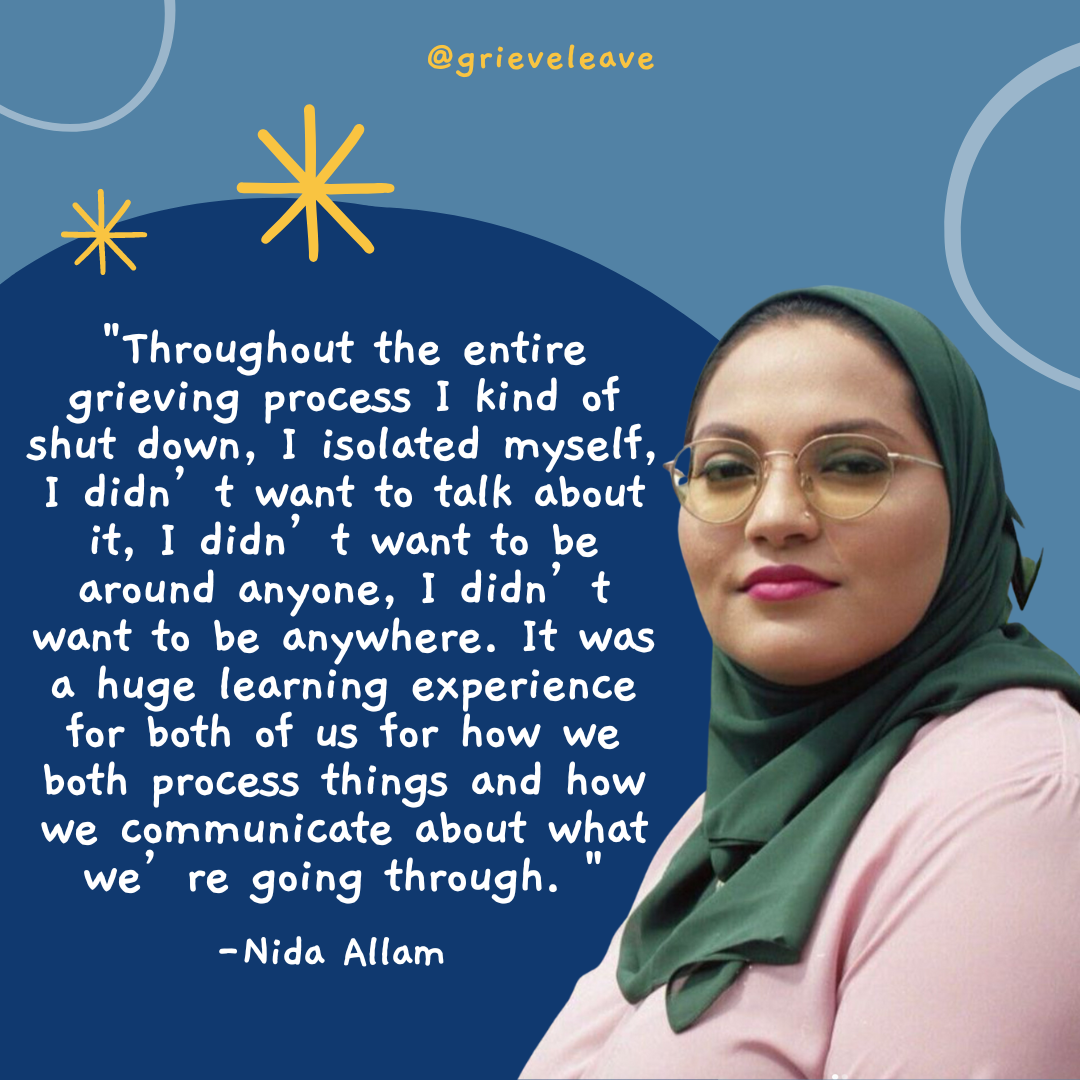3 Takeaways on Mother’s Day, Pregnancy Loss, and Grief
May 07, 2023
In honor of Bereaved Mother’s Day today, we want to acknowledge all of the mothers in our community, and beyond, who have lost a child, whether it was due to accident, illness, pregnancy loss, stillbirth, or any other circumstance. We want you to know that you are not alone in your grief.
This week, we had the honor of sitting down with three brilliant minds and leaders, from all different walks of life, who all share the painful grief of pregnancy loss. For many who have experienced pregnancy loss, Mother’s Day brings up feelings of grief and isolation. Grieve Leave founder Rebecca sat down with Dr. Julie Shaw, Nida Allam, and Meredith Shiner to discuss the grief of pregnancy loss and how each of these women grieved, and continue to grieve, to shine a light on this type of loss.
Watch the full interview here and read some of the key quotes that stood out from the conversation.
Words Matter: Why we say “pregnancy loss,” not “miscarriage”
“I never use the word miscarriage, I only say pregnancy loss. And there are two reasons for that. First and foremost, I think the word miscarriage infers a sense of blame. There was no miscarriage of justice here, I didn’t drop a football as the person who was carrying the pregnancy and lost the pregnancy. I didn’t do anything wrong.
But, I also think that using the word pregnancy loss is much more inclusive. When we use a word like ‘miscarriage,’ I think we put all of the weight on the person who was carrying the pregnancy and don’t recognize that there are other stakeholders in that pregnancy. Had I had my son and had he lived, he would have had many stakeholders in his life, including my partner, our parents, and our friends. There are so many people who lose when you lose a pregnancy, and to not use the word ‘loss,’ I think you’re excluding their very legitimate grief and not allowing them to be stakeholders in that grief.
‘Pregnancy loss,’ itself as a term is much more universal and it also runs the gamut of scenarios. Someone who continues to try IVF and loses out on it, they are suffering pregnancy loss. Someone who delivers a baby at 22 weeks and 6 days, like I did, that’s a loss. Using the word ‘loss’ ends up including all of the people and all of the scenarios that we might face, and that we should talk about, and that we should recognize as legitimate.”

Meredith Shiner
Meredith is a professional writer and strategic communications consultant with expertise in national politics, media relations, government affairs, crisis management, opinion writing, broadcast, and social media, with her writing appearing in Politico, The Daily Beast, Yahoo News, MSNBC, PBS NewsHour, and more. Meredith has spoken bravely and openly about the pregnancy loss she experienced.
We Need to Recognize Intersectionality In Grief
“Going through different trials during my fertility journey, and especially being a Black woman, there are cases of things like fibroids, and having to go through different procedures. Having to go through that–I’ll be quite frank, that was torture for me.
Through my journey with my partner, it was really challenging because I came with these ideas and stories in my head of how my journey would be. These ideas and stories that we’re fed from when we were children, you think that’s how it will go and we’re not really explained to how it’s a true miracle to have conception happen, even with the aid of medical help.
I’m married to a woman, so that also adds another intersection of identity into this. The nuances of that are that I was going to be the one to carry because I was older and it was something that I had always wanted to do that she didn’t necessarily want to. In our journey, it started to become apparent that I was not able to carry, and that was very hard for me, especially after a couple of failed embryo transfers. I feel like that’s where I experienced my pregnancy loss, with the hopes of implanting the embryo and going through the waiting process, and then when you get that call, trying to hold space for that.
After going through two transfers and pregnancy losses, my wife eventually did carry and we do have an almost five month old now. There is a bittersweetness in that, being able to see the pregnancy in my wife, within the walls of our home, and I was absolutely grieving seeing her carry our child. Some people might judge this, but we need to understand how our grief can be activated when we see other people in our world, our friends, that are carrying a child when we want that to be us. When that person was in my house, sleeping next to me, that added a whole new layer of grief for me.
Even when I was processing my grief actively, there were moments, even touching my wife’s belly, that were hard for me. It was hard for me to wrestle with the fact that I am going to be the mother of this child, and I wondered how I could have these feelings. I had done everything possible, even before my daughter was born, to intentionally meet this grief head on so that I could be the best mother to this child. I did not want that grief to reside in me, so that when she was born I would be able to give her the best of me and never have her doubt my love for her.
…There’s a lot of loss in my story and there’s so much diversity in what we all experience.”

Dr. Julie Shaw
Dr. Julie Shaw (she/her) is an educator, grief wellness advocate, and experienced griever. Dr. Shaw is committed to building an inclusive community of grievers who are curious, ready to explore and moved to find ways they can integrate grief into their lives and continue to thrive. She is the founder of Hello I‘m Grieving, a community where grievers can find support and motivation through creative thought provoking in person and virtual events. Dr. Shaw has been extremely vulnerable in discussing her experience with infertility, and most recently she did an “Infertility Photoshoot” to draw attention to her personal struggles and the pain that women who struggle to get pregnant often suffer from.
We May Not Recognize Ourselves in Our Grief, and That’s Ok
“My husband and I grieved through the entire process in very different manors. I think it was a learning experience for both of us. Throughout the entire grieving process I kind of shut down, I isolated myself, I didn’t want to talk about it, I didn’t want to be around anyone, I didn’t want to be anywhere. The fact that on top of going through this loss I was still having to go to the doctor every single day to get my blood drawn to make sure the pregnancy was still resolving itself, I didn’t have time to process anything. It had become so medical, so clinical.
My husband, on the other hand, wanted to talk about it, he wanted to talk about what happened, he wanted to share how he was feeling, and in that moment, I wasn’t ready for it. I think that was really difficult for both of us, because we were grieving so differently, and since I had shut down in that way. I realized he was also grieving the fact that his wife had become so distant from him through all of this, and he was alone through a lot of this. It was a huge learning experience for both of us for how we both process things and how we communicate about what we’re going through.
During the process, I didn’t even want to see my family. I remember laying in bed and my sister and my husband would try to pull me out of bed and take me out on a walk. I’m so grateful that they did that, because it was not good to just be laying in bed, but it was also what I needed at certain times.”

Nida Allam
Nida Allam is the first Muslim woman ever elected to public office in North Carolina. She was moved to run for office after her three best friends were killed in a hate crime that local elected and police insisted on calling a parking dispute. The daughter of Indian and Pakistani immigrants, Nida grew up in the triangle. In addition to serving as Durham County Commissioner, she also served in senior leadership in the NC Democratic Party and as chair of the Durham Mayor’s Council for Women. As a public official in North Carolina, Nida has publicly shared her struggles with fertility and the loss of her pregnancy last year, helping to bring vulnerable and important conversations to the forefront.
–
Our biggest takeaway though? These conversations matter. Too many of us feel isolated and ashamed in our grief. We need to shine a light on our grief and all of its shapes, forms, and nuances, so that we can actually grieve, together.
Join the Grieve Leave movement
Share your info to join our Grieve Leave community. You don’t want to miss anything!


